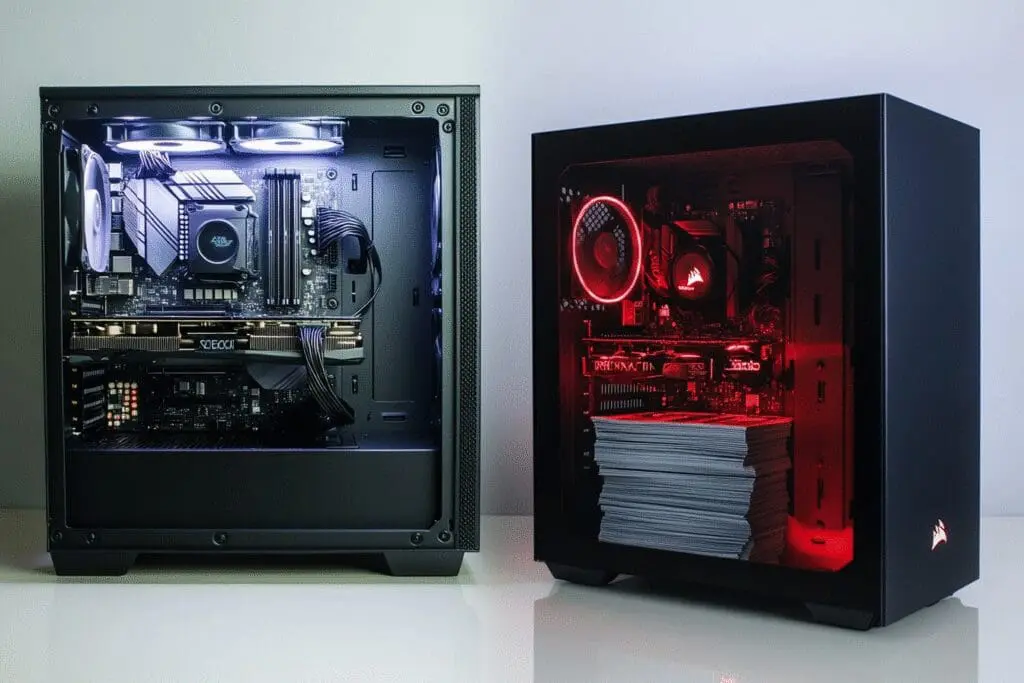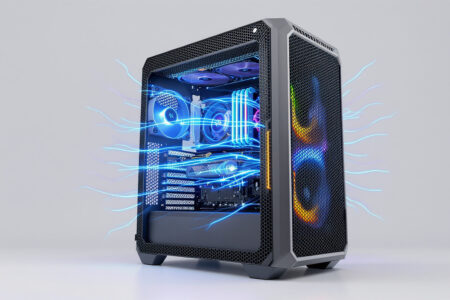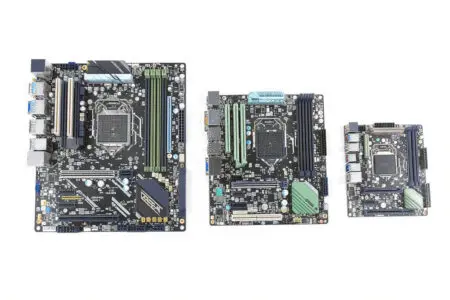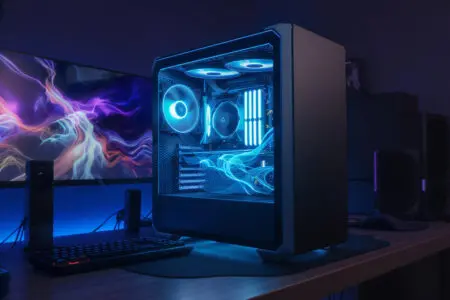Ever stared at a high-end, pre-built gaming PC, looked at the jaw-dropping price tag, and thought, “Could I just build this myself for less?” It’s a question that echoes through online forums and countless YouTube tutorials. The short answer is yes, overwhelmingly so. Building your own gaming PC is almost always cheaper than buying a pre-built machine with the exact same components. But the real story is a bit more nuanced than a simple yes or no.
The true savings aren’t just about the initial price tag; they’re about control, customization, and long-term value. When you build, you become the architect of your own gaming experience. You get to choose every single part, from the powerhouse graphics card to the silent hum of your case fans. This guide will break down exactly where you save money, what the hidden costs are, and how you can get the most bang for your buck, ensuring your custom rig outperforms and outlasts any off-the-shelf option. So, if you’re wondering, “Is it cheaper to build a gaming PC?”, you’ve come to the right place.
More in Hardware Category
How to Build a Gaming Computer
Why is Building Your Own Gaming PC Typically Cheaper?
The fundamental reason building a PC costs less comes down to one thing: you’re cutting out the middleman. Companies that sell pre-built PCs aren’t just selling you computer parts; they’re selling you a service. This service includes sourcing the components, assembling the machine, installing the operating system, and providing customer support. All of that costs money, and that cost is passed directly on to you, the consumer.
Consequently, you’re paying a premium for convenience. Think about it like a meal kit delivery service versus buying groceries. The meal kit is easy and straightforward, but you’re paying extra for the curated ingredients and instructions. Buying the groceries yourself takes more effort, but it’s undoubtedly cheaper. Similarly, when you build your own PC, you are only paying the retail price for the components. There are no assembly fees or added markups for labor. This direct-to-consumer approach is where your initial savings really stack up.
Are Pre-Built PCs Just Overpriced Parts?
Not exactly, but you are paying for more than just the hardware. Pre-built manufacturers like Dell, HP, or even boutique builders have overhead costs. They have employees to pay, warranties to honor, and marketing budgets to fund. For instance, a graphics card that costs $500 at retail might be part of a pre-built system that includes a significant markup to cover these business expenses.
Furthermore, these companies often buy components in bulk, which gets them a discount. However, they rarely pass the full extent of those savings on to the customer. Instead, they pocket the difference as profit. By sourcing your own parts, you can hunt for deals, take advantage of sales, and make strategic choices that a big company simply can’t offer on a mass scale.
Here’s a simple breakdown of the added costs in a pre-built PC:
- Assembly Labor: Someone has to physically put the computer together.
- Software Installation: Installing and configuring Windows and other drivers takes time.
- Warranty and Support: A portion of the price covers the cost of future customer service.
- Marketing and Overhead: The costs of running the business are baked into the price.
- Profit Margin: At the end of the day, they are a business aiming to make a profit.
What Are the Real Costs When You Build a Gaming PC?
While the core components are the main expense, it’s important to have a holistic view of the budget. It’s not just about the processor and graphics card. Building a PC means you’re responsible for everything, and a few things can catch first-time builders by surprise.
First and foremost, you have the main hardware. This is the heart of your machine and where the bulk of your money will go. You need to carefully select each one to ensure they are compatible with each other and fit your performance goals. For example, your motherboard needs to have the correct socket for your CPU, and your power supply must have enough wattage to handle your graphics card.
Beyond the big-ticket items, there are other essential purchases. The operating system, typically Windows, isn’t free. While there are ways to use it unactivated or to purchase keys from third-party sellers, a legitimate license from Microsoft comes with a cost. Moreover, you’ll need the basic tools to put it all together, like a set of screwdrivers. Thankfully, you don’t need a massive toolbox; a single Phillips-head screwdriver is often enough.
What Is a Complete List of Components You Need to Buy?
To avoid any last-minute trips to the store or frustrating delays, it’s best to have a complete checklist before you start buying. A balanced gaming PC requires several key parts working in harmony.
Here is a comprehensive list of what you’ll need to purchase:
- Central Processing Unit (CPU): The “brain” of your computer.
- Motherboard: The central hub that connects all your components.
- Memory (RAM): For multitasking and temporary data storage.
- Storage (SSD/HDD): Where your games, files, and operating system live. A Solid State Drive (SSD) is essential for fast loading times.
- Graphics Card (GPU): The most important component for gaming performance.
- Power Supply Unit (PSU): To provide clean, stable power to everything.
- Case: The chassis that houses and protects your hardware.
- Operating System (OS): Most gamers will opt for Windows.
This list covers the essentials for a functioning computer. However, you might also need case fans for better cooling, especially if you plan on pushing your system hard.
Are There Any Hidden or Unexpected Costs I Should Know About?
Absolutely. One of the biggest “gotchas” for new builders is forgetting about the peripherals. If you’re upgrading from an old system, you might be able to reuse your monitor, keyboard, and mouse. But if this is your very first gaming PC, you’ll need to budget for these items as well. A high-refresh-rate gaming monitor can be a significant expense on its own, so it’s crucial to factor that into your total budget.
Another potential cost is shipping. Unless you’re lucky enough to live near a major electronics retailer, you’ll likely be ordering your parts online. Shipping fees can add up, especially for larger items like the case. Also, consider the potential for “DOA” (Dead on Arrival) parts. While rare, it can happen. Having to return a component and wait for a replacement can be a frustrating delay, though it usually doesn’t incur an extra cost beyond your time.
Finally, think about future upgrades. One of the greatest advantages of building your own PC is the ease of upgrading. When a new, more powerful graphics card is released, you can simply swap out the old one. This long-term flexibility is a form of saving money, as you won’t need to buy a completely new system every few years.
How Does Buying Pre-Built Compare in Price for Different Budgets?
To truly answer the question, “Is it cheaper to build a gaming PC?”, it helps to look at concrete examples across different budget levels. The price gap between building and buying can change depending on how much you’re willing to spend.
At the lower end of the spectrum, say around $600 to $800, the savings from building are significant but might be less dramatic. Pre-built manufacturers can sometimes offer entry-level systems at competitive prices because they get deep discounts on older, bulk-ordered components. However, these systems often cut corners in critical areas like the power supply or motherboard, which can limit future upgrades. When you build your own budget PC, you can allocate your funds more wisely, perhaps spending a little more on a quality PSU that will last for years to come.
As you move into the mid-range and high-end tiers, the financial benefits of building become impossible to ignore. Once you’re spending over $1,200, the “convenience tax” on pre-built systems grows substantially. A custom-built $1,500 PC will almost certainly outperform a pre-built one at the same price point, often by a noticeable margin. This is because you can invest the money saved from labor costs directly into a better graphics card or a faster processor.
Can a Pre-Built PC Ever Be Cheaper?
In very specific, rare circumstances, yes. During periods of extreme market volatility, like the graphics card shortages seen in recent years, large manufacturers had better access to components than individual consumers. Their purchasing power allowed them to secure GPUs at prices far below the inflated open market rates. In those unique situations, buying a pre-built was sometimes the only economical way to get a modern gaming rig.
Another instance is during major sales events like Black Friday. Occasionally, big-box retailers will offer a pre-built system as a “loss leader” to get customers in the door. These deals can be very aggressive, sometimes pricing the entire system at or below the cost of its individual parts. However, these deals are the exception, not the rule. For a fascinating look at how component costs are analyzed, some universities, like Purdue University, offer course materials that break down the economics of computer hardware.
For the vast majority of the time, though, if you compare a pre-built PC to a custom-built one with identical or equivalent components, the custom build will be the cheaper option.
What Skills Do I Need to Build a PC and Is It Hard?
The idea of building a computer can be incredibly intimidating. It sounds like a highly technical task reserved for electrical engineers. In reality, it’s much more like building with LEGOs. The process is surprisingly straightforward, and the components are designed to fit together in only one way. If a part doesn’t seem to fit, it’s almost certainly because you’re trying to put it in the wrong place.
You don’t need any prior experience with electronics or soldering. All you need is the ability to follow instructions and a little bit of patience. The community support for PC building is one of its greatest strengths. There are thousands of detailed video guides on platforms like YouTube that walk you through every single step, from installing the CPU to managing your cables.
The most challenging part for many beginners isn’t the physical assembly; it’s the component selection. With so many options for CPUs, motherboards, and GPUs, it can feel overwhelming. Fortunately, there are fantastic online tools, like PCPartPicker, that help you choose compatible parts and compare prices from different retailers. This takes most of the guesswork out of the equation.
How Much Time Does It Take to Assemble a Gaming PC?
For a first-time builder, it’s wise to set aside a full afternoon. A realistic timeframe is anywhere from three to five hours. This gives you plenty of time to unbox everything, read the motherboard manual (which is highly recommended), and assemble the parts without rushing. Rushing is how mistakes happen, like forgetting to install the motherboard’s I/O shield before mounting it in the case—a classic rookie error.
Here’s a rough breakdown of the time commitment:
- Preparation and Unboxing: 30 minutes
- Motherboard Assembly (CPU, RAM, SSD): 1 hour
- Case Installation (Motherboard, PSU): 1 hour
- Component Installation (GPU, Cables): 1 hour
- Software Installation and Setup: 1 hour
Experienced builders can often assemble a PC in under two hours, but there’s no prize for speed. The goal is to be methodical and careful. The feeling of pressing the power button for the first time and seeing your creation light up is incredibly rewarding and well worth the time invested.
Is Building a PC Worth It Beyond Just Saving Money?
The financial savings are the main draw for many, but the benefits of building your own gaming PC extend far beyond the initial cost. The experience itself provides a deep sense of ownership and accomplishment. You’ll gain a much better understanding of how a computer works, which is a valuable skill in its own right.
This knowledge empowers you to troubleshoot problems more effectively. If something goes wrong down the line, you won’t be completely in the dark. Because you assembled it yourself, you’ll have a good idea of where to start looking for the issue, whether it’s a loose cable or a software conflict. This self-sufficiency is liberating and can save you from costly repair shop visits.
Ultimately, the biggest advantage is customization. A pre-built PC is a one-size-fits-all solution. When you build, you tailor the machine to your exact needs and preferences. Do you care more about raw gaming performance or a whisper-quiet operation? Do you want a sleek, minimalist case or a flashy RGB light show? You get to make every decision, creating a computer that is uniquely yours. This level of personalization is something that money simply can’t buy from a big-name manufacturer. The long-term value, from easier upgrades to a deeper connection with your hardware, makes building a PC an investment in your hobby, not just a purchase.
Frequently Asked Questions – Is It Cheaper to Build a Gaming PC
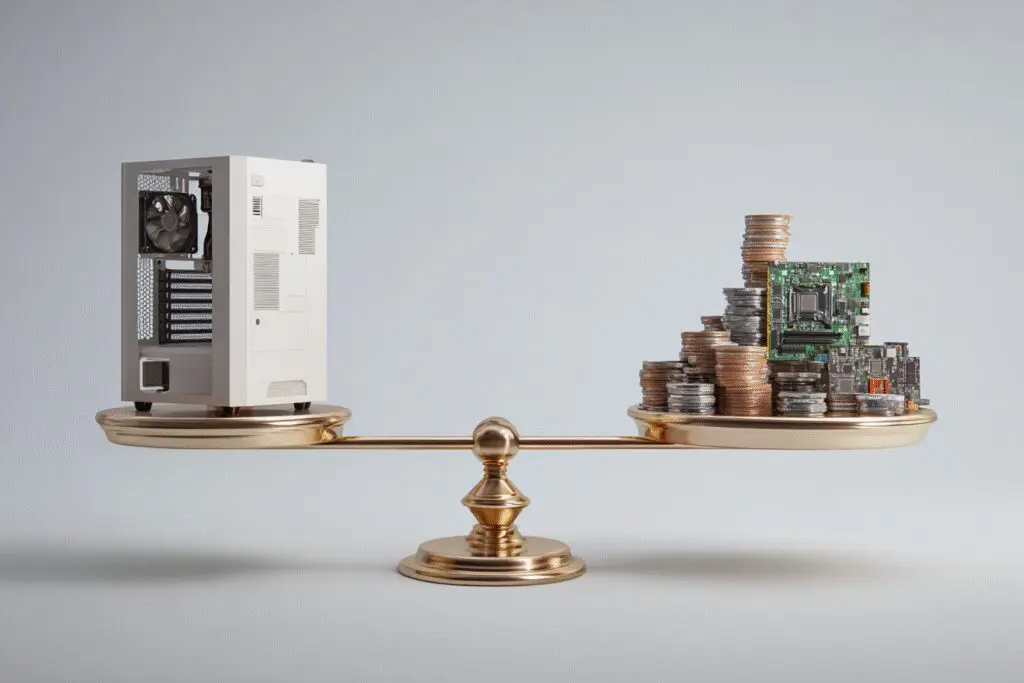
How can I decide whether building or buying a gaming PC is right for me?
Choose to build if you want to save money, enjoy building and learning, desire a custom system, and accept the challenge; buy if you want convenience, simplicity, warranty coverage, and limited time for assembly.
What are some challenges associated with building a gaming PC?
Building a gaming PC can be challenging because it requires time to learn about parts, careful assembly to avoid damage, troubleshooting potential issues, and managing multiple warranties if parts fail.
When would it make more sense to buy a prebuilt gaming PC instead of building one?
It makes sense to buy a prebuilt PC if you want a ready-to-use machine with a warranty, prefer saving time, avoid the complexities of building, or find good deals during sales.
What are the main benefits of building my own gaming PC besides saving money?
Building your own PC allows you to choose every part to suit your needs, use quality components from trusted brands, upgrade easily in the future, and avoid unnecessary pre-installed software.
Is building a gaming PC generally more cost-effective than buying a prebuilt one?
Yes, building a gaming PC is typically cheaper than purchasing a prebuilt one, as you can select and buy individual parts, often saving between $150 to $1000 depending on the build.

